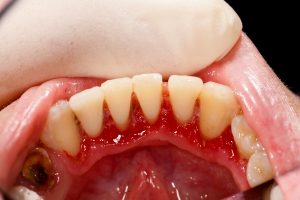Knowing Your Risk for Gum Disease

Gum disease, or periodontal disease, can affect anyone. However, there are certain risk factors that make it more likely that you will develop gum disease. If gum disease is left untreated, it can cause a number of serious problems with dental health and overall health, such as tooth loss, bone loss, and infection. This is why it is important to visit a dentist serving Glen Ellyn for regular dental care. Keep reading to learn more about the risk factors that contribute to gum disease.
Risks Factors Related to Oral Hygiene
Gum disease is caused by poor dental hygiene. If you don’t participate in regular dental care at home and with a family dentist, you increase your risk of developing gum disease. If you don’t brush and floss your teeth regularly, the bacteria that naturally occur in your mouth will combine with your saliva to form plaque on your teeth. If this plaque buildup is untreated, it will harden and form tartar. The bacteria harbored in tartar can cause gingivitis, which is the precursor to gum disease. If gingivitis is left untreated, it will progress to gum disease.
Risk Factors Related to Lifestyle
Certain lifestyle choices can greatly increase your risk of gum disease. Smoking, or other nicotine use, is one of the most significant risk factors. Nicotine is extremely harmful to the gum tissue and can damage the tissue, making it susceptible to disease and infection. Smoking also decreases your saliva production. Saliva is your mouth’s way of naturally flushing harmful bacteria out of your mouth. Some prescription medications can also decrease your mouth’s natural saliva production.
Other Important Risk Factors
While there are some risk factors that you can control, there are others that you cannot. Hormonal changes in women and girls, due to puberty, pregnancy, or menopause, can make them more susceptible to developing gum disease. People who suffer from certain diseases and illnesses, such as HIV, diabetes, and cancer, are also at increased risk. You may also have a genetic predisposition for contracting gum disease.
